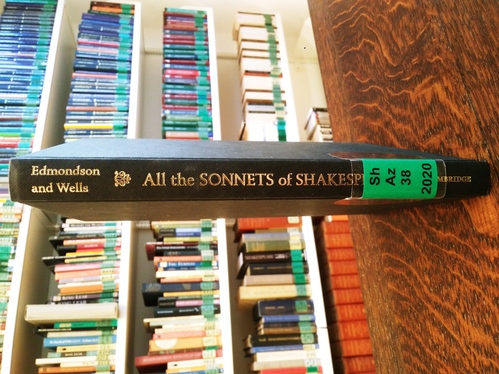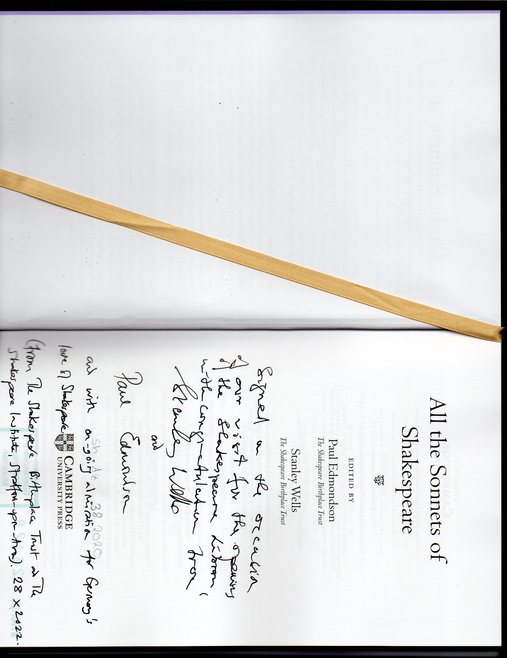Paul Edmondson and Stanley Wells "All the Sonnets of Shakespeare"
Paul Edmondson and Stanley Wells, All the Sonnets of Shakespeare (2020)
“Not marble nor the gilded monuments
Of princes shall outlive this powerful rhyme,
But you shall shine more bright in these contents
Than unswept stone besmeared with sluttish time.” (Sonnet, Nr. 55)
In 1609 a book left the printing press of the London publisher Thomas Thorpe (1569-1625) that announced on its title page: Shakes-Speares Sonnets: Never before Imprinted. Following Shakespeare’s successful publication of the narrative poems Venus and Adonis (1593) and The Rape of Lucrece (1594), this collection of 154 sonnets and the additional long poem A Lover’s Complaint was Shakespeare’s first publication as a writer of poems after fifteen years and had, except for some poems included in the anthology The Passionate Pilgrim (1598 or 1599), never been printed before.
In light of the reception of Shakespeare’s poetical work, the significance of the 1609 edition cannot be overestimated. The arrangement of the sonnets in this edition has fostered biographical interpretations and encouraged the frequently repeated view that the first 126 sonnets refer and are addressed to the ‘Friend’ or ‘Fair Youth’, while the remaining 28 sonnets concern the ‘Dark Lady’. Speculations regarding biographical incidents and details of courtship encoded in the sonnets started shortly after their publication because this was also an inherent part of the sonnet genre (Philipp Sidney’s Astrophel and Stella is another example for this).

In their new edition All the Sonnets of Shakespeare (2020) Paul Edmondson and Stanley Wells invite Shakespeare scholars and readers to study Shakespeare’s poetical works afresh. Their edition introduces two new approaches: Firstly, it includes not only the sonnets from Never before Imprinted, but also sonnets from Shakespeare’s plays. They argue that at many points of his career Shakespeare used sonnets “to change, vary, and heighten the dramatic mood” and note that “Shakespeare seems, on the surviving evidence, to be a pioneer in broadening the stylistic range of drama by using sonnet form for spoken dialogue in the linguistic fabric of plays.” (p. 1) All the Sonnets of Shakespeare therefore contains 182 rather than the usual 154 sonnets, 23 of which are taken from the plays.
Secondly, the sonnets are arranged chronologically. Drawing on earlier suggestions as well as on current Shakespeare scholarship, Edmondson and Wells present Shakespeare’s sonnets “in the order in which [they believe] they were written” (p. 2). A chronological ordering, they explain, defamiliarizes the poems in a way which fosters new readings and interpretations and thus offers a counterpoint to the dominance of biographical approaches in scholarship on this part of the Shakespeare canon.
Edmondson’s and Well’s aim in All the Sonnets of Shakespeare is to honour Shakespeare’s “bursts of creativity; his development as an artist, his skill in his use of the form for different purposes, his employment of it across different genres, and his engagement with the sonnet as a private, personal, intimate form of verse, and as one which could be heard in public theatres.” (p. 25)
The Munich Shakespeare Library holds a special copy of All the Sonnets of Shakespeare with a personal dedication by Paul Edmondson and Stanley Wells. The copy was signed on the occasion of the reopening of the Munich Shakespeare Library on 27 October 2022. As friends of the Munich Shakespeare Library and representatives of the Shakespeare Birthplace Trust in Stratford-upon-Avon, Paul Edmondson and Stanley Wells had travelled to Munich on the occasion of the library’s reopening. Stanley Wells also delivered a personal address. The day after the ceremony, Paul Edmondson and Stanley Wells visited the Shakespeare Library at Amalienstraße 83, where a team of scholars from the chair of Prof. Dr. Claudia Olk had set up an exhibition on the library’s history, its international relations, and future activities. While exploring the library, Edmondson and Wells noted the “ongoing admiration of Germany’s love for Shakespeare”, as their autograph states. All the Sonnets of Shakespeare is among the library’s most cherished and thought-provoking holdings.


